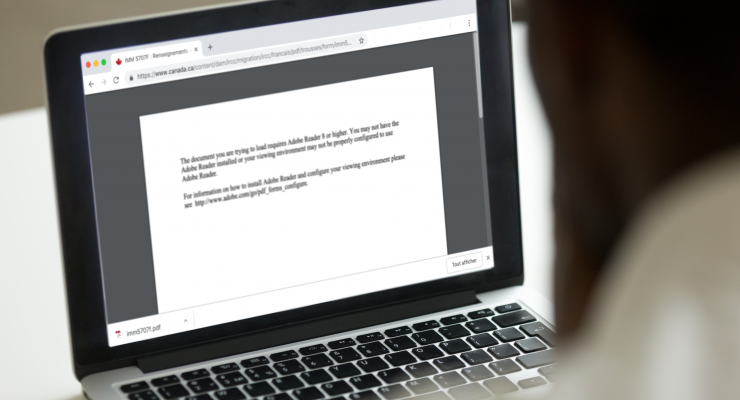MAKING THE MOST OF YOUR CANADIAN ADVENTURE
It may take you a few days or weeks to get over the jet lag, unpack and adjust to the weather. Don’t rush! But then, at some point, you’ll be ready for the adventure—finding long-term accommodation options, job hunting, deciphering Canadian culture and more.
If that time has come, read on!
Improving your French or English skills
The better your English or French skills are, the smoother your Canadian adventure will go. Meeting people, asking for help and advice, finding a job and getting by with limited communications skills is frustrating and exhausting.
If your French is better than your English, you may choose to stay (or start) in Quebec or in New Brunswick (the only officially bilingual province). But if you don’t mind a new challenge, embrace life in the many English-speaking provinces and territories!
And if you’re a native English speaker, why not pick up some French? Start with reading the French version of this Guide, the Guide des pvtistes au Canada[JG1] !
Worried about your accent, your grammar and your lack of exposure to French and English? Relax, there are many ways to boost your language skills before and during your trip.
Improving your listening and reading skills
You don’t need to be in Canada to start working on your listening and reading skills. Even better, you can do it for free. It’s a global world, chances are you can access media from all over the world, including from Canada. Leverage these resources to sharpen your listening skills, learn new vocabulary, get used to the North American accent and stay abreast of local issues in Canada.
Online newspapers and magazines are a good way to gain insight into Canada. Try The Globe and Mail, the National Post, the Financial Post (for business news) or even a few city newspapers like the Calgary Herald for local news. The CBC is a great resource as well, with articles and videos.
You can also watch your favourite series and movies in English with or without subtitles. Find American or Canadian TV channels and discover a few programs. Try the National Film Board of Canada to watch short movies and documentaries online.
Paying attention to the lyrics of your favourite bands is also a good way to learn slang and popular expressions—just make sure to use them wisely… Most of the time, you can find a copy of the lyrics online.
Audio books can help you get familiar with standard accents and syntax. Listen to stories you’ve read before, they will be easier to understand.
Finally, listening to radio programs in English is a good way to sharpen your listening skills and improve your vocabulary and grammar. And don’t forget podcasts! It’s a very trendy medium right now with amazing reports, documentaries, fictions and more.
Improving your writing skills
Head to the forum(s) of your choice to chat and debate in English. Few people will correct grammatical errors (although it might happen!) but the more you read messages written by native speakers the more you’ll pick up correct syntax and proper vocabulary (and Internet slang).
Don’t forget to stop by pvtistes.net’s busy French forum for the latest info en français!
Improving your speaking skills
Practise informally with friends, coworkers and acquaintances
Canadians love small talk. Get used to commenting on the weather or exchanging pleasantries with perfect strangers while waiting in line at the grocery store or during bus trips. And so what if you stumble over your words at first? You’ll never see that person again!
Social gatherings are a good way to practise your English or French skills in a relaxed setting. Besides, let’s be honest, good food and a drink do help a lot…
If your language skills are good enough to work in an English or a French environment, you’ll soon notice how quickly you’re progressing. Emails, meetings, industry lingo, formal and informal interactions… sure, these situations may be nerve-wracking at first but you’ll be amazed at your own abilities after a few weeks.
Oh, and don’t forget a classic Hollywood scenario—flirting with someone you like… A bilingual relationship is sure to help your language skills!
Finally, remember that there’s a large immigrant population in Canada and many people have an accent. For starters, Francophones may have an accent in English and English speakers may have an accent when they speak French. In large cities, everybody is used to communicating with people who have various levels of language proficiency. Nobody is going to laugh at you.
Practise with a conversation partner
Many websites can help you find a “language partner” online or in your area. Your ideal language exchange partner will be a native French or English speaker interested in learning your mother tongue. In most cases, you spend time conversing in each language, with the native speaker helping and correcting the learner. You can meet in person in a public place or connect online if there are no language partners available in your area.
This is a very effective way to pick up idiomatic skills in a safe and encouraging environment. Besides, you will likely learn a thing or two about Canadian culture or your destination city and your conversation partner could become a new friend!
Practise during volunteer experiences
If you feel your language skills aren’t strong enough yet to find a job in your field, consider volunteering with the WWOOF movement or through the HelpX program. This could be a great opportunity to become more comfortable in an English-speaking environment without the pressure to perform as an employee.
Taking language classes
Consider taking language classes before or during your trip.
Canada is a popular destination for foreign students and there are many language schools. Besides, many Canadians choose to study French or English as a second language to add a new skill to their resume—that’s life in a bilingual country!
Taking classes in Canada will help you meet people from all over the world and most of the time, English or French will be the lingua franca among you.
Don’t forget that pvtistes.net partners with several language schools—Including ILAC (Toronto and Vancouver) and ATPAL (Montreal)[JG2] —offering discounts to members.

















 Français
Français English
English




0 comments
{{like.username}}
Loading...
Load more